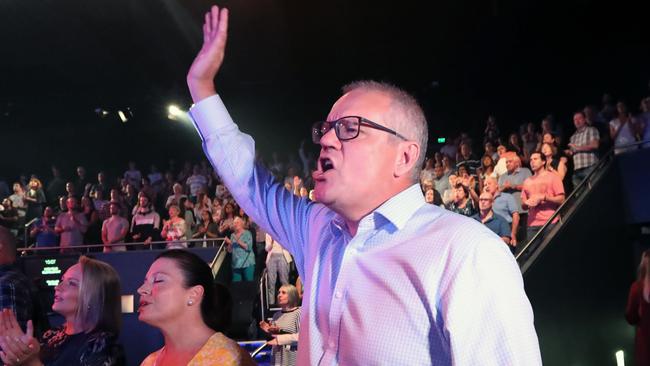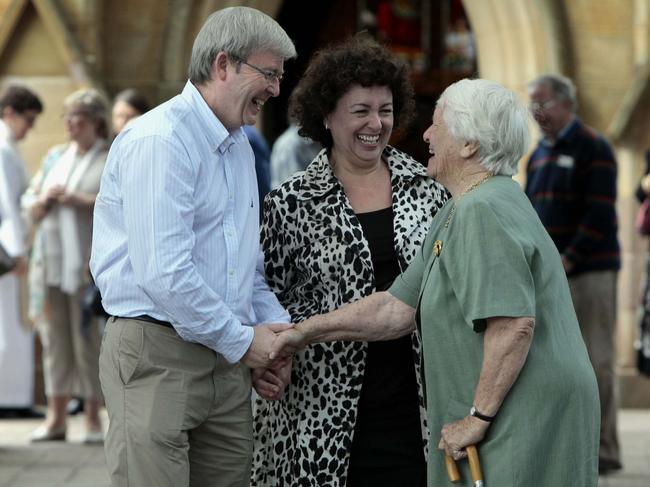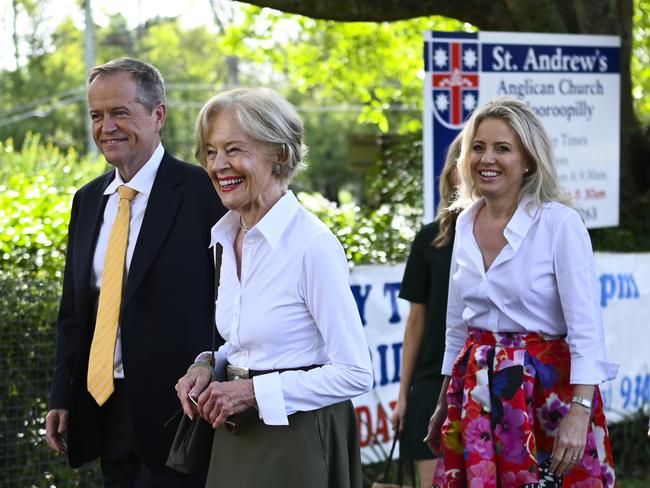Hands up for your faith
With Christianity under siege, it’s uplifting to see Scott Morrison comfortable in his belief.

In every place of worship, I want men to pray with holy hands lifted up to God, free from anger and controversy
— 1 Timothy 2:8
-
Lift up your hands to the holy place and bless the Lord
— Psalm 88
-
There he is in photos and on television, Scott Morrison, our Prime Minister, in an open-neck shirt, right arm high in the sky, palm forward, eyes closed, swaying in song and prayer, at the Horizon Pentecostal church that he and his family have attended since they moved into Sutherland Shire on Sydney’s southern beaches.
It is a striking image, one we’ve not seen before. Prime ministers at prayer are normally solemn, not to say po-faced, in the front pew of an Anglican or sometimes Catholic cathedral, at the funeral of a fellow politician or at Christmas or Easter, well dressed in a suit and tie. We almost never see them in their own regular worship.
The Morrison image was so novel it was not surprising it drew attention. It was pushed off the front pages by the tragic and terrible images of the churches and hotels bombed in Sri Lanka on Easter Sunday.
The terrorist attacks in Sri Lanka remind us that Christianity is the most heavily persecuted religion in the world. The persecution of Christians doesn’t gain the attention it should in mainstream Western media because that media is still in thrall to the idea that Christianity represents a powerful establishment, whereas in most places it is likelier to represent a marginalised people.
It is also the case that Christianity, though in decline in the West, is on fire with new growth and conversions in Africa, Asia and Latin America.
It would be absurd to suggest Christians in Australia face active persecution, but there is an increasing atmosphere of hostility and contempt for Christianity. Yet Morrison, as a frank and open Pentecostal Christian, the first in the world to lead a major developed democracy, may be doing something to change that, at least incrementally, at the margin.
Twitter goes nuts
The reaction on Twitter to Morrison at prayer was of course sewer-like and demented. But Christians can’t really claim something special here. The reaction to everything is sewer-like and demented on Twitter. That’s what Twitter does. One Twitter contributor claimed to see Nazi overtones in Morrison’s hand gesture. The West Australian branch of the Construction Forestry Maritime Mining and Energy Union briefly posted a tweet of Morrison with his hand raised and the caption: “Beware of false prophets (or should that be profits?)”.
Morrison dismissed social media attacks as “keyboard warriors in their mother’s basement” and compared them with the people who daub swastikas on the election posters of Jewish politicians such as Josh Frydenberg.
The mainstream media reaction was more sensible. But even commentators who rejected the criticism of Morrison were uneasy about his inviting the cameras into Horizon church, as though religious worship, other than at ceremonial occasions, was something that should occur strictly in private among consenting adults, with perhaps a trigger warning if broadcast on TV.
There is a confused overhang of the old secular settlement in Australia. Traditional Australian secularism was never meant to banish God and the consciousness of God from public life. Still less was it meant to remove the Christian inspiration from modern Western ethics. Human rights in the West derive from the tradition that each human being is created in the likeness of God, possesses an immortal soul and has a unique relationship with God.
Even when Western ethics has moved away from the specific Christian doctrine, it relies on Christian moral categories to shape arguments of human rights and social compassion. This historical process is outlined brilliantly in Larry Siedentop’s magisterial work, Inventing the Individual: The Origins of Western Liberalism.
Australian secularism was designed to limit religious argument between different Christian denominations. The English-Irish and Protestant-Catholic division lay at the heart of European settlement in its earliest days and continued as a powerful force right up until the 1950s. Both sides, Catholic and Protestant, can readily adduce statements of prejudice against the other from Australian history. We settled this by a good-natured agreement that sectarianism would not define public life. Two Catholics, James Scullin and Joseph Lyons, faced off as prime minister and opposition leader in the 1931 election, an unthinkable situation in Britain.
Sectarian non-issues
Nor was the determination to avoid sectarianism restricted to Christian denominations. John Monash became Australia’s supreme military commander in World War I despite being Jewish, a militiaman rather than a professional soldier, and the son of central European immigrants. When Europe was re-embracing the most putrid anti-Semitism, the Jewish Sir Isaac Isaacs became our first native-born governor-general. The controversy in his appointment centred not on his Jewish faith but that he was the first GG not from Britain.
Australia has an enviable record of religious pluralism and good-natured tolerance. This is starting to wear a bit thin as a virulent anti-Christian prejudice has crept into much elite culture in the past few decades.
Kevin Rudd, in the first volume of his memoirs, Not for the Faint-hearted, makes this argument eloquently. He writes: “A final question relates to our domestic political conversation, and whether we have reached a new age of religious intolerance when only the irreligious are tolerated and the religious are not, where the giant leaps of faith implicit within secular philosophy are accepted as normal in the public space, but where those who seek to take their understanding of the gospels as their starting point are attacked for the hoariest old chestnut — that of trying to bring religion into politics.”
Rudd further writes: “There is a space for faith, tempered by reason, in the public place.” Rudd has his critics and his admirers. I have known him moderately well for 35 years and have never doubted the sincerity or depth of his religious convictions. Indeed, he devotes a serious chunk of the first volume of his memoirs to arguing the case for religious belief.
He was unusual in holding something akin to a doorstop each Sunday after he went to church services. Some religiously observant MPs were privately critical of Rudd for this, thinking that it politicised his religion. I think this criticism was mistaken. The media was going to follow Rudd to church anyway and he quite straightforwardly owned his religious convictions. They were part of his personality and it is a good thing he didn’t hide them.
Nor, however, did he claim divine authorisation for his policies.

Rudd benefited from a media double standard. Western intellectual prejudice will respond positively to only one type of public Christian: the social-justice variety. The secular Left believes in radical wealth redistribution and in the evils of capitalism. It is happy to claim Christians as allies in these specific battles, so long as the Christians involved do not make any other claims or ever talk seriously about God.
Double standards
The double standard is evident in the spiteful, ludicrously unfair way in which Tony Abbott’s modestly conservative Catholicism was derided. I have known Abbott for well over 40 years and have never doubted the sincerity or depth of his religious convictions.
Abbott mostly tried not to intrude his religion into his public persona. Rather than have the media follow him to church, he would hold Sunday morning doorstops outside his home. Abbott probably didn’t always present his religious convictions in the most sympathetic way. To take one trivial point — it was perfectly accurate and legitimate for him to describe himself as a traditional Catholic, but it would have been better, more naturally inclusive, to describe himself as a Christian.
John Howard, unless the context was overtly historical, never used the term Protestant.
But you get the impression that no matter what Abbott did, much of the media would be against him.
Morrison, so far, has handled the religious dimensions of his public life very well. Many commentators ask why he allowed the cameras inside Horizon church. The initiative for this came from Horizon itself. The Pentecostals feel they are not well known or understood, so they are welcoming the media to come in, sit down, watch the service, listen to the preaching, enjoy the music and take their own measure.
It is truly ridiculous to accuse the Pentecostals of being secretive, an absurd allegation for which there is no evidence, and then criticise them for having the media in.
The Horizon scene was not quite unprecedented. Shortly after he became Prime Minister, Morrison attended the Melbourne Pentecostal church Planetshakers. It is a brilliant church, and one I know well. It uses social media as effectively as any religious movement in Australia. It live-streams big church services through its website. So Morrison was seen by the world praying at Planetshakers.
When Morrison is travelling on a Sunday, he routinely goes to church. There is a church within his Pentecostal network in most cities, but Morrison is very comfortable at other Christian and indeed non-Christian churches.
He is a deep friend of the Sydney Maronite community, whose Easter services he attended. And he has visited countless churches of many different Christian denominations, as well as synagogues, mosques, Buddhist temples and Sikh gurdwaras.
If he is at a Pentecostal church, he is often invited on to the stage to say a few words, offer a prayer. He generally leads a prayer for the nation. He prayed for rain for drought-afflicted rural Australia at Planetshakers.
He never says anything political from a church stage.
Every political leader has to offer the public not only a policy platform and effective leadership, they also have to somehow forge a relationship with the people. It is a good part of politics that they expose some of their private self.
Bob Hawke in office was a reformed drinker who followed the horses and loved a bet. He was also a gifted intellectual. Gifted intellectual is not an identity with which Australians easily identify. The bloke who used to booze too much and likes the horses, that’s more familiar.

Howard is genuinely devoted to cricket, a devotion shared by millions of Australians. Forging a bit of a link on such a basis is not only not improper or cynical, it’s part of the glue that holds democratic life together.
Although Morrison has been a central figure in six years of Coalition government, as Prime Minister he had to introduce himself to the Australian people. One identity he has, quite truly, is that of a mad Cronulla Sharks supporter. Another is as a Pentecostal Christian. Despite a ludicrous and frequently inaccurate effort at demonisation in The Monthly magazine, Pentecostals are a mainstream and attractive expression of Bible-based Christianity.
They are the fastest growing Christian denomination in Australia and around the world. They emphasise an emotional experience of God, which is not doctrinally unorthodox but is stylistically distinctive. They are, after Catholics, the second largest Christian denomination in Australia by church attendance.
The Morrison prime ministership represents a distinct new stage in their mainstreaming and they represent for him not only the life of faith and community but also a bridge to regular Australians.
Greg Sheridan is the author of God is Good For You: A defence of Christianity in troubled times (Allen & Unwin)


To join the conversation, please log in. Don't have an account? Register
Join the conversation, you are commenting as Logout